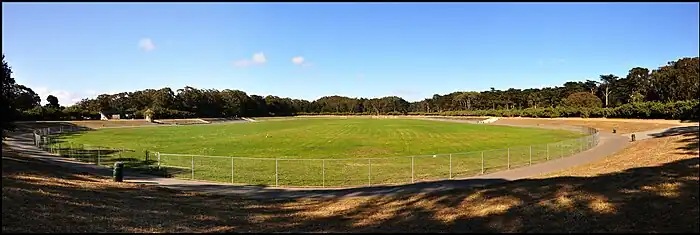 | |
| Former names | Golden Gate Park Stadium (1906-36) |
|---|---|
| Address | 1232 John F. Kennedy Dr San Francisco, CA 94121 |
| Location | Golden Gate Park |
| Owner | City and County of San Francisco |
| Operator | San Francisco Recreation & Parks Department |
| Capacity | 57,000 |
| Construction | |
| Broke ground | January 6, 1905 |
| Opened | July 4, 1906 |
| Construction cost | $50,000 ($1.63 million in 2022 dollars[1]) |
| Architect | Reid & Reid |
The Polo Fields is a large multi-purpose stadium and sporting field in San Francisco's Golden Gate Park.[2] Despite its name, polo is rarely played on the Polo Fields. The facility has a multitude of uses.[3] There are six regulation soccer pitches on the grass field, surrounded by a .67-mile cycle track.[4] Wooden bleachers flank the north and south sides of the cycle track surrounding the field.[5] Surrounding the grass field, cycle track, and bleachers is a 0.75-mile (1,210 m) dirt track used for running and horse riding.[6]
History
The Polo Fields has been the site of diverse events over the years.[7] The Polo Fields was originally called the Golden Gate Park Stadium and opened in 1906 as a velodrome.[8] Cyclists from all over the West Coast have used the track for over a century.[9] In 1967, the Human Be-In counterculture music concert was held on the Polo Fields.[10] The Polo Fields was also the home field for San Francisco-based rugby clubs in the Northern California Rugby Football Union from the 1960s through the early 1990s. It was the site of the Golden Gate Rugby Tournament, held in April, during this time.
Tenants
Cycling, soccer and cross country running events are frequently held on the Polo Fields all year long. The annual Outside Lands Music and Arts Festival is held on the Polo Fields each August.[11] From 1986[12] to 2009,[13] the annual Bay to Breakers[14] footrace held its post-race event, Footstock, at the Polo Fields each May.

Cycling Track
The historic cycling track at the Polo Fields was a 1 kilometer long paved track used by cyclists for training and events. The cycling track was a centerpoint of bicycle racing from the 1930s through the 1950s.[15]
The local group Friends of the Polo Field was recently formed to restore the cycling track to the original condition when it was created.
See also
References
- ↑ 1634–1699: McCusker, J. J. (1997). How Much Is That in Real Money? A Historical Price Index for Use as a Deflator of Money Values in the Economy of the United States: Addenda et Corrigenda (PDF). American Antiquarian Society. 1700–1799: McCusker, J. J. (1992). How Much Is That in Real Money? A Historical Price Index for Use as a Deflator of Money Values in the Economy of the United States (PDF). American Antiquarian Society. 1800–present: Federal Reserve Bank of Minneapolis. "Consumer Price Index (estimate) 1800–". Retrieved May 28, 2023.
- ↑ "SFGate Events". The San Francisco Chronicle. Archived from the original on 15 May 2013. Retrieved 17 April 2013.
- ↑ "Golden Gate Park (West)". Retrieved 17 April 2013.
- ↑ "Cycling in the SF bay area cyclingtales.com". Retrieved 17 April 2013.
- ↑ "The Polo Fields and the Hellyer Velodrome". Retrieved 17 April 2013.
- ↑ "US Track - Polo Fields". Retrieved 17 April 2013.
- ↑ "SF Days - Golden Gate Park History". Retrieved 17 April 2013.
- ↑ "Golden Gate Park - Polo Fields". 20 January 2010. Retrieved 17 April 2013.
- ↑ "Bikely - Polo Fields". Retrieved 17 April 2013.
- ↑ "PBS American Experience". PBS. Retrieved 17 April 2013.
- ↑ "SF Outside Lands". Retrieved 17 April 2013.
- ↑ "75th Examiner Bay to Breakers Highlight Show". Retrieved 2 May 2020.
- ↑ "Bay to Breakers is a race with a price". 24 February 2010. Retrieved 2 May 2020.
- ↑ "Bay to Breakers". Retrieved 17 April 2013.
- ↑ "License to Race: Cycling on the Golden Gate Park Polo Field 1930s–1950s | www.flysfo.com". www.flysfo.com. Archived from the original on 2015-02-04.